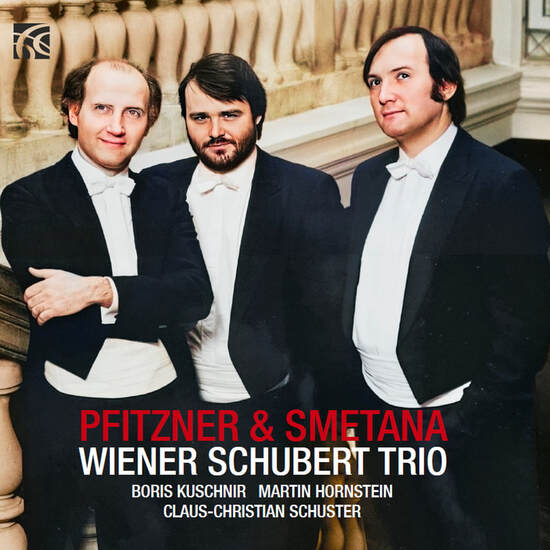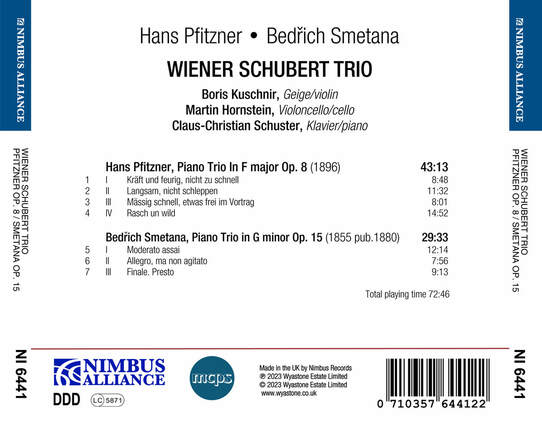'Hans Pfitzner (1869-1949) and Bedřich Smetana (1824-84) hold special places in music history as ardent nationalist composers and creators of significant stage works. Pfitzner’s operas and incidental music culminated in his Palestrina (1917), while Smetana established a canon of eight national operas incorporating traditional Czech dance and song into much of his mature oeuvre. Both composers also contributed widely to other genres, including significantly, if not extensively, to the chamber music repertory. Although written more than forty years apart, these two piano trios share notable common ground. Both were written during troubled times for their creators and count among their composer’s first mature artistic achievements; moreover, both resort to motivic recall or transformation between movements with the intention of realising structural unity, and both received hostile critical receptions.' Robin Stowell.
The Wiener Schubert Trio (Vienna Schubert Trio) was founded in 1985 and performed as a full-time ensemble until 1993. From the outset the Trio appeared regularly in the music centres of Europe, North America and Asia, and established rapidly a reputation as one of the foremost piano trios. After its first United States tour in 1986, the Trio was named the year’s ‘Best New Visiting Chamber Ensemble’ by The Washington Post. The Ensemble devoted itself to both the established masterpieces of the repertoire and many less familiar works, often presented in the context of concert series designed to demonstrate relationships between various composers and styles.
Claus-Christian Schuster (b.1952): Taught initially by his father, he went on to study at the Vienna Musikhochschule, Indiana University School of Music and Moscow Tchaikovsky Conservatory. He has won numerous international piano and chamber music competitions, and until 1984 he performed worldwide as a soloist. After he founded the Vienna Schubert Trio he made regular guest appearances. However, immediately after the break-up of the Vienna Schubert Trio in 1993 he formed the Altenberg Trio Vienna, where he continued his international chamber music activities with increased intensity.
Martin Hornstein (1954–2009) was most influenced by his teachers Valentin Erben and Harvey Shapiro as well as by members of the Alban Berg Quartet, who stirred his early interest for chamber music. He has performed as a chamber musician with numerous colleges including Christian Altenburger, Thomas Christian and Eszter Haffner as well as with ensembles like the Aron Quartett, the Artis Quartet and the Orlando Quartett. Between 1985 and 1993 he was the Vienna Schubert Trio's 'cellist, and from 1994-2004 a member of the Altenberg Trio Vienna. With these two ensembles he gave more than 1,000 performances across the world.


